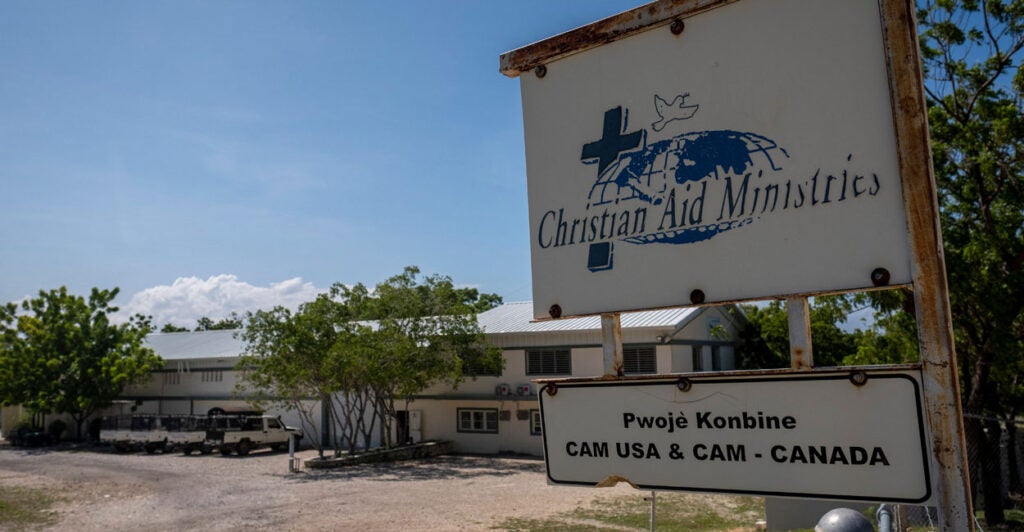The recent kidnapping of 17 missionaries—16 American, one Canadian, and five of them children—and a local driver in Haiti has drawn international attention to the epidemic of escalating violence and lawlessness the Haitian people have been suffering for years.
Coming on the heels of the July assassination of President Jovenel Moïse, the intensifying criminal activity is undermining what little authority the government in Port-au-Prince has been able to exert. The Haitian police are either incapable of confronting the problem or, all too often, complicit with the gangs perpetrating it.
On Oct. 19, The New York Times reported that the kidnappers demanded a ransom of $17 million, equating to about $1 million for each North American hostage. In a video posted Oct. 22, the head of the gang publicly threatened to execute the American hostages if the ransom is not paid.
The same 400 Mawozo gang kidnapped five priests and two nuns, including French nationals, in April. They were eventually released.
400 Mawozo, which loosely translates from Creole to “400 country simpletons,” is one of the country’s largest gangs. Based in the Ganthier commune on the main road to the neighboring Dominican Republic, the gang has reportedly grown to nearly 1,000 members and wields significant power in the Port-au-Prince suburbs, including the Croix-des-Bouquets commune where the missionaries were abducted.
While kidnappers have historically targeted middle-class Haitians, the operation has evolved over the last two years to include foreigners, clergy members, and even poor street vendors often forced to pay with household items.
Haiti has recorded a total of 782 individuals kidnapped since January, including 53 foreigners, according to the Center for Analysis and Research in Human Rights, a Haiti-based nonprofit. This nears the 796 individuals kidnapped in 2020. Vice News reported a startling 400% increase in kidnappings from 2019 to 2020.
Weak and ineffective rule of law is a significant factor in Haiti’s history of extremely low scores in The Heritage Foundation’s annual Index of Economic Freedom. But the problem has reached a new dimension.
Added to prolonged economic hardship exacerbated by COVID-19 and the government’s inability to confront the long-standing gang problem—which is often tied to the state or political opposition groups—Haiti is mired by a political crisis that has spurred exponential increases in kidnappings and gang violence.
Elections in Haiti have become a business for gangs, InSight Crime recently explained. Politicians have forged close alliances with gangs for years, often viewing them as tools to mobilize voters, attack rivals, and intimidate opposition voters come election time.
However, since Moïse’s postponement of the 2019 parliamentary elections—which have yet to be held—gangs have been left without this steady income source.
Moïse, in turn, ruled by decree for nearly 18 months until his assassination, intensifying the country’s instability and exposing the state’s failure to maintain order.
This was followed by a 7.2 magnitude earthquake in August that crippled much of the nation’s southwestern infrastructure and left over 300 dead and at least 1,800 injured.
Haiti now has more than 167 gangs, according to one United Nations’ estimate. They have also grown in size and are increasingly independent of the political patrons that once enabled them, as is the case with the G9 and Family gang federation in Port-au-Prince, closely associated with the Moïse government and one of Haiti’s most powerful criminal networks.
By one estimate, gangs control up to 40% of Port-au-Prince. Worse yet, roughly 60% of the total Haitian electorate lives in gang-controlled areas, which also paints a dark picture for rural Haiti.
Moïse declared a state of emergency in his last months in office, which his Council of Ministers amended to include joint action between the armed forces and the national police to combat gangs. That same month, he asked the Organization of American States for regional assistance after four policeman died in a raid.
While the U.S. has poured billions in development and humanitarian aid over the last decade, a much smaller percentage has been destined to security. Regional coordination around security assistance has largely been absent, especially since the end of the United Nations Stabilization Mission in Haiti ultimately marred by scandal.
Future security assistance efforts to Haiti should consider tools outside of the discredited United Nations peacekeeping option. But the omission of any emphasis on security is startling, particularly given the hike in violence and the subsequent regional migrant crisis.
Haitians made up roughly half of the 30,000 migrants recorded crossing Texas’ Del Rio bridge in mid-September alone, most of them making their way from Central America and South America, where many had already received asylum.
Later that month, 16,000 additional Haitian migrants were reported to be in Colombia awaiting travel by way of the dangerous jungles in Panama’s Darien Gap northbound to the U.S. southern border. The Panamanian foreign minister predicted in early October that a second wave of migrants travelling north from Haiti and several other countries would near 60,000.
The convergence of tragedies that has propelled the most recent wave of violence in Haiti demands the attention of Congress and the Biden administration. Deploying the FBI to Port-au-Prince to assist in the recovery of the American and Canadian hostages is a necessary step in the right direction.
But, if the last several months are any indication, Haiti’s woes require a comprehensive security response by the West—one that learns from the shortcomings of previous endeavors. With the safety and security of Americans now on the line, it must also be one with American leadership at the forefront.
Have an opinion about this article? To sound off, please email letters@DailySignal.com and we’ll consider publishing your edited remarks in our regular “We Hear You” feature. Remember to include the URL or headline of the article plus your name and town and/or state.
